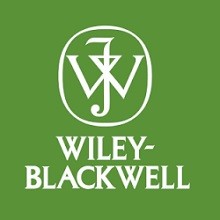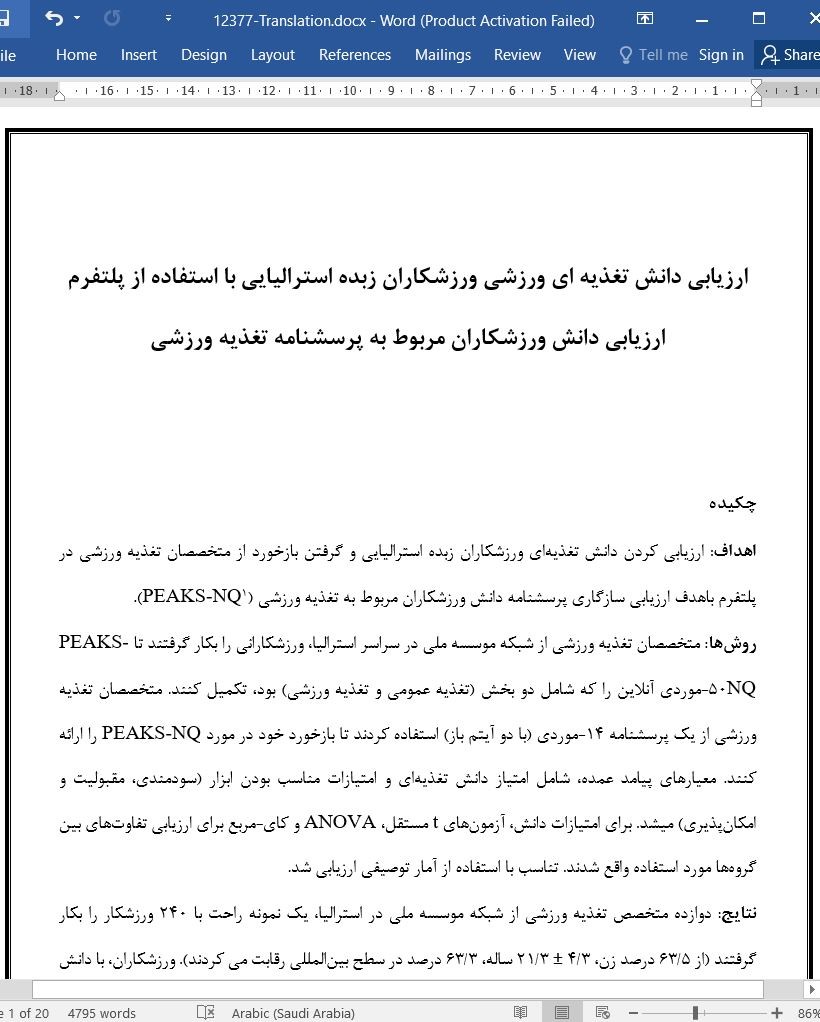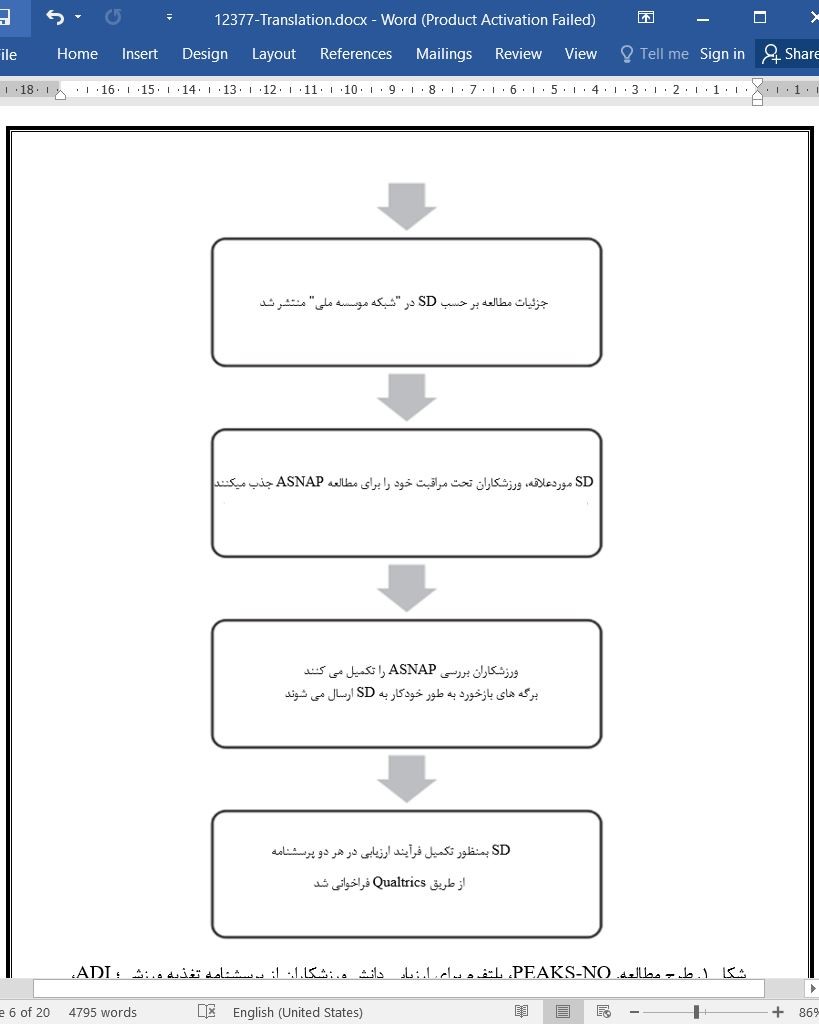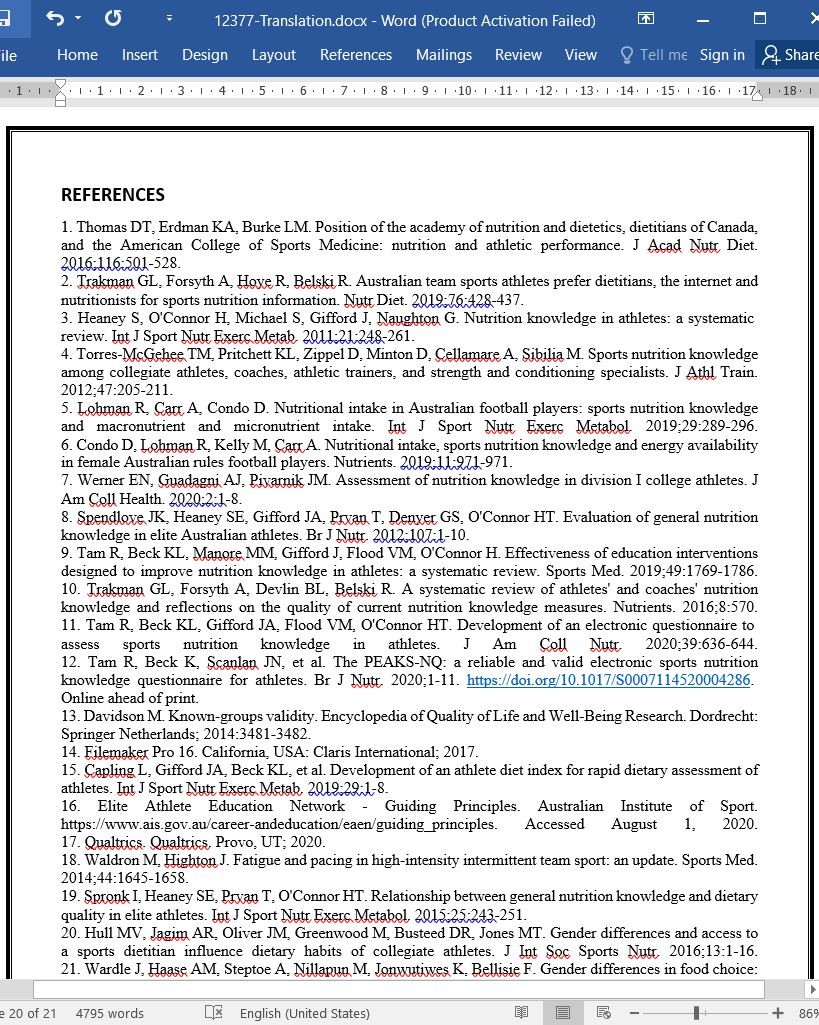
ارزیابی دانش تغذیه ای ورزشی ورزشکاران زبده استرالیایی با استفاده از پلتفرم ارزیابی دانش ورزشکاران
چکیده
اهداف: ارزیابی کردن دانش تغذیهای ورزشکاران زبده استرالیایی و گرفتن بازخورد از متخصصان تغذیه ورزشی در پلتفرم باهدف ارزیابی سازگاری پرسشنامه دانش ورزشکاران مربوط به تغذیه ورزشی (PEAKS-NQ ).
روشها: متخصصان تغذیه ورزشی از شبکه موسسه ملی در سراسر استرالیا، ورزشکارانی را بکار گرفتند تا PEAKS-NQ50-موردی آنلاین را که شامل دو بخش (تغذیه عمومی و تغذیه ورزشی) بود، تکمیل کنند. متخصصان تغذیه ورزشی از یک پرسشنامه 14-موردی (با دو آیتم باز) استفاده کردند تا بازخورد خود در مورد PEAKS-NQ را ارائه کنند. معیارهای پیامد عمده، شامل امتیاز دانش تغذیهای و امتیازات مناسب بودن ابزار (سودمندی، مقبولیت و امکانپذیری) میشد. برای امتیازات دانش، آزمونهای t مستقل، ANOVA و کای-مربع برای ارزیابی تفاوتهای بین گروهها مورد استفاده واقع شدند. تناسب با استفاده از آمار توصیفی ارزیابی شد.
نتایج: دوازده متخصص تغذیه ورزشی از شبکه موسسه ملی در استرالیا، یک نمونه راحت با 240 ورزشکار را بکار گرفتند (از 5/63 درصد زن، 3/4 ± 3/21 ساله، 3/63 درصد در سطح بینالمللی رقابت می کردند). ورزشکاران، با دانش تغذیهای عمومی در مقابل دانش تغذیهای ورزشی بهتر، امتیاز 5/10 ± 7/70 درصدی دریافت کردند. زنان، صرف نظر از تفاوت برای سن یا ورزش انجام شده نمرات کلی بالاتری داشتند (001/0 P <). ورزشکاران با تحصیلات دانشگاهی، نسبت به ورزشکاران فاقد تحصیلات دوران سوم، نمرات بالاتری کسب کردند (004/0 = P). چندید شکاف دانش در چربی ها (نقش و منابع تغذیهای)، تغذیه بهبود و بازیابی و مدیریت ترکیب بدنی شناسایی شد. متخصصان تغذیه ورزشی تناسب PEAKS-NQ با توافق کامل بر 8 مورد از 12 مورد را مثبت ارزیابی کردند.
نتیجهگیری: ورزشکاران، از تغذیه عمومی در مقایسه با مفاهیم تغذیه ورزشی درک بیشتری دارند و ممکن است از آموزش بکارگیری تغذیه در زمینههای خاص ورزش ها بهره بگیرند. پاسخ های متخصصان تغذیه ورزشی چنین نشان داد که PEAKS-NQ، یک معیار با قابلیت پذیرش، امکان پذیری و سودمندی بالا است.
1-مقدمه
ورزشکاران زبده برای انرژی رسانی بهینه، بازیابی و سازگاری با نیازهای تمرینی شدید خود، نیازهای تغذیه ای مخصوصی دارند. سطح بالای دانش تغذیهای که دربردارنده حوزه تغذیه عمومی و نیز حوزه تغذیه ورزشی باشد، فراهم کننده درک تغییر مصرف رژیم غذایی برای رفع این نیازها می باشد. ورزشکاران استرالیایی، پیش از این اولویت خویش برای دریافت اطلاعات تغذیهای از متخصصان تغذیه را نشان داده اند و از اینرو ارزیابی دانش تغذیهای قادر به ارائه بینش ارزشمندی درباره شکافهای دانش، ارائه راهی برای «استواری» دشواری مداخلات آموزشی بمنظور به حداکثر رساندن ادراک بوده و به پزشکان اجازه دهد تا اثربخشی آموزش را ارزیابی کنند.
Abstract
Aims To evaluate the nutrition knowledge of elite Australian athletes, and to obtain feedback from sports dietitians on the Platform to Evaluate Athlete Knowledge of Sports Nutrition Questionnaires' (PEAKS-NQ) suitability.
Methods Sports dietitians from the National Institute Network across Australia recruited athletes to complete the online, 50-item PEAKS-NQ which contained two sections (General Nutrition and Sports Nutrition). Sports dietitians provided feedback on the PEAKS-NQ using a 14-item questionnaire (with two open-ended items). The main outcome measures were nutrition knowledge score and tool suitability (usefulness, acceptability and feasibility) scores. For knowledge scores, independent t-tests, ANOVA and Chi-square tests were used to evaluate differences between groups. Suitability was evaluated using descriptive statistics.
Results Twelve sports dietitians from the National Institute Network in Australia recruited a convenience sample of 240 athletes (21.3 ± 4.3 years, 63.5% female, 63.3% competed internationally). Athletes scored 70.7 ± 10.5%, with better general vs sports nutrition knowledge. Females had higher overall scores (P < .001) with no differences for age or sport played. University-educated athletes scored higher than non-tertiary educated athletes (P = .004). Knowledge gaps were identified in fats (role and food sources), recovery nutrition and managing body composition. Sports dietitians rated suitability of PEAKS-NQ positively with complete agreement on 8 of 12 items.
Conclusions Athletes have greater understanding of general nutrition compared to sports nutrition concepts and may benefit from education on applying nutrition in sports-specific contexts. Sports dietitians' responses showed PEAKS-NQ was a highly acceptable, feasible and useful measure.
1 INTRODUCTION
Elite athletes have special nutrition requirements to optimally fuel, recover and adapt to their strenuous training demands.1 High levels of nutrition knowledge encompassing both general nutrition and sports nutrition domains provide the understanding to alter dietary intake to meet these needs. Australian athletes have previously indicated their preference for receiving nutrition information from dietitians,2 and therefore nutrition knowledge assessment can provide valuable insight into knowledge gaps, provide a way to appropriately “pitch” the difficulty of education interventions to maximise understanding, and allow practitioners to assess the effectiveness of education.3
چکیده
1-مقدمه
2-روش ها
3-نتایج
4-بحث
منابع
Abstract
1 . INTRODUCTION
2 . METHODS
3 . RESULTS
4 . DISCUSSION
REFERENCES
- اصل مقاله انگلیسی با فرمت ورد (word) با قابلیت ویرایش
- ترجمه فارسی مقاله با فرمت ورد (word) با قابلیت ویرایش، بدون آرم سایت ای ترجمه
- ترجمه فارسی مقاله با فرمت pdf، بدون آرم سایت ای ترجمه



